There are many types of keywords in SEO you can use to optimize your content to rank in the organic search results. There are also other categories of keywords you should be familiar with that relate to the paid side of search engine marketing.
This guide explains the different keyword types in the SEO industry along with their search intent. It also provides examples for each of the keyword categories so you know how to use the variations for your search engine optimization strategy.
Types of Keywords In SEO
1. Short-Tail Keywords
The first type of keywords in SEO are short-tail keywords, which are keywords and phrases that are 1-2 words in length. A short-tail keyword has the highest search volume and the most SEO competition; however, they’re also not well-targeted for conversions because the search intent can be ambiguous for users.
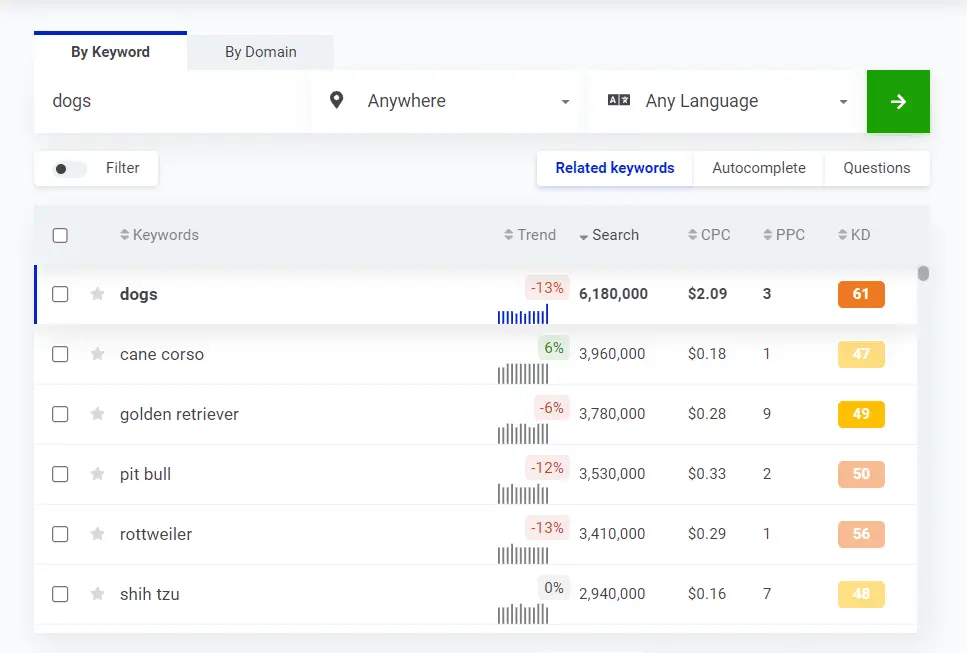
Examples of short-tail keywords:
- dogs
- cat food
- search engine optimization
- restaurant
- marine biology
2. Medium-Tail Keywords
The next keyword type is medium-tail keywords, which are keyword phrases that are 3-4 words in length. A medium-tail keyword has moderate search volume and average competition. This keyword category is also more targeted than short-tail keywords because the user search intent is easier to establish and, therefore, has a higher conversion rate.
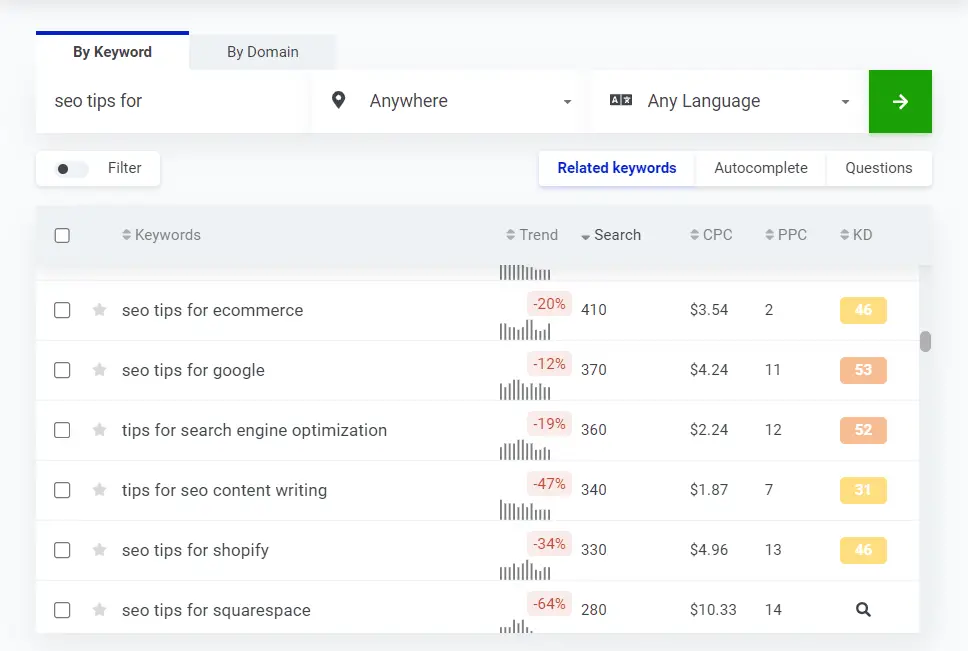
Examples of medium-tail keywords:
- dog that can swim
- cat bowl sizes
- small business marketing strategies
- SEO tips for bloggers
- self defense weapons
3. Long-Tail Keywords
Long-tail keywords are the third type of SEO keyword based on length. A long-tail keyword is a phrase with five words or more. These keywords have the lowest search volume, least competition, and very specific user search intent. These characteristics make this category of keywords good to target for organic search rankings and lower-cost paid advertising campaigns.
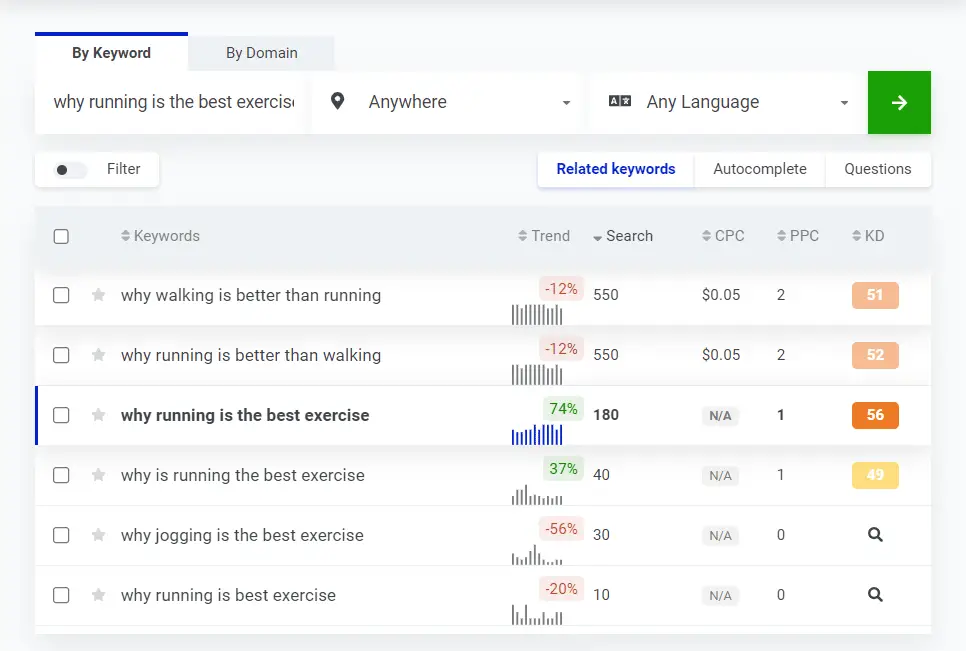
Examples of long-tail keywords:
- dogs that don’t have dander
- cat treats for older cats
- why running is the best exercise
- benefits of long tail keywords
- how to add keywords to Google Business
See this related guide on how to find long-tail keywords for SEO if you want to use this strategy for your website content.
4. Informational Keywords
Informational keywords are keywords that indicate a user’s intent to learn or find information about a topic. These keyword types typically start with “who”, “what”, “when”, “where”, “why”, “how”, “can”, “do”, “does”, “is”, and “will”; however, they don’t necessarily have to include those qualifiers. Some users omit the qualifier when conducting a search, but the intent is still the same.
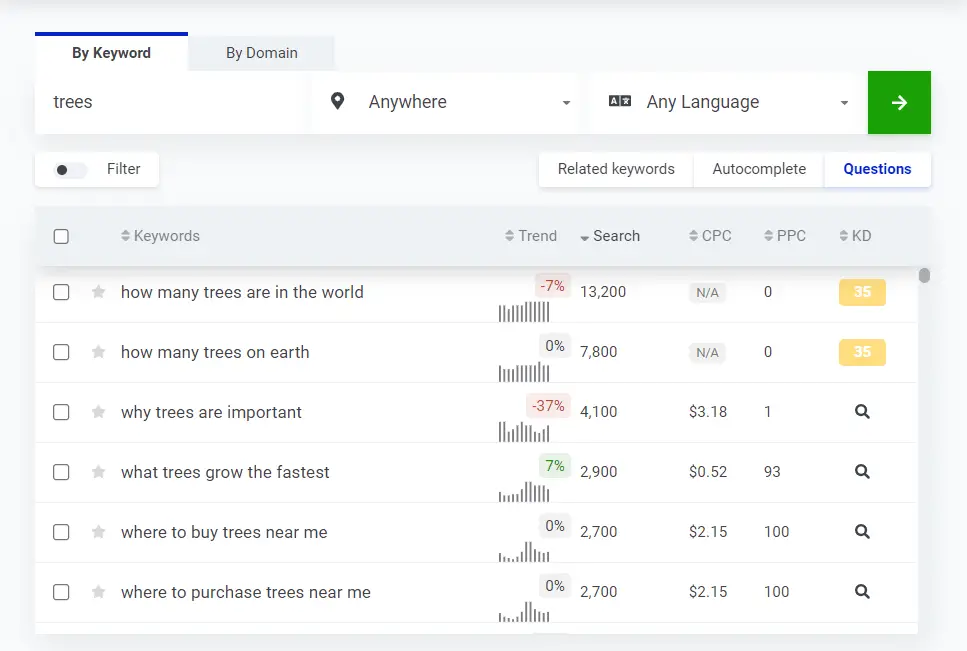
Examples of informational keywords:
- what is SEO
- calories in beer
- how do trees reproduce
- next federal holiday
- why are flights so expensive
5. Transactional Keywords
Transactional keywords are used in search engine marketing to attract visitors who are ready to purchase a product or service. These keywords have the strongest search intent for taking an action and are commonly known as buyer keywords. These types of keywords typically begin with words such as “best”, “top”, “buy”, “purchase”, and “order” or include transactional-related terms at the end of the phrase like “for sale”, “to buy”, “near me”, and “review”.
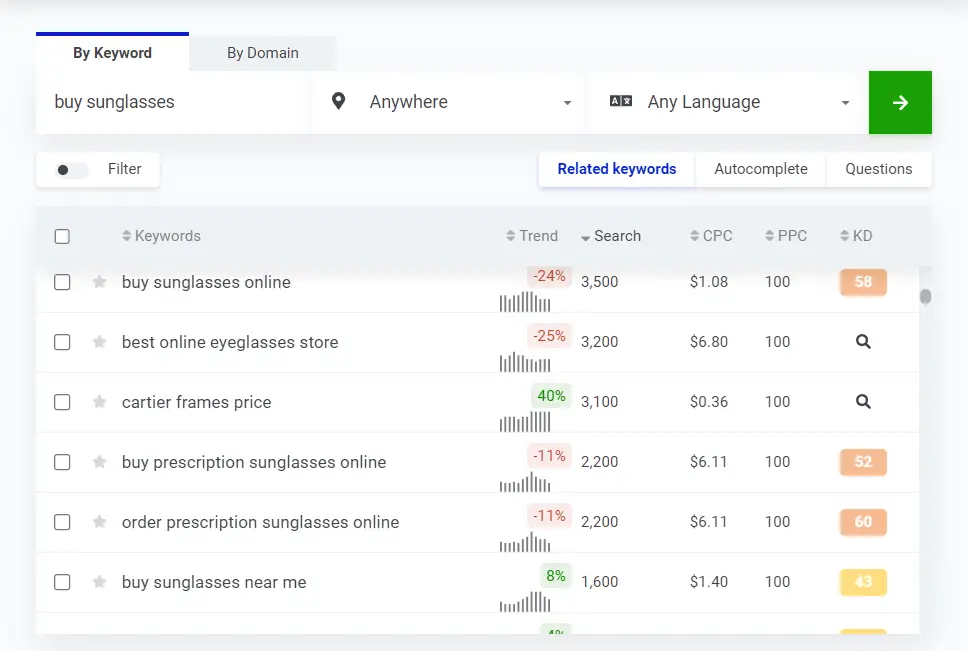
Examples of transactional keywords:
- best SEO companies
- top link building tools
- buy sunglasses online
- Jeeps for sale near me
- binoculars for sale in Denver
6. Navigational Keywords
Navigational keywords are terms and phrases people use in search engines when they know what they want but are not exactly sure how to find it online. Common types of navigational keywords include search terms where a user is looking for a particular website, brand, or product to purchase. The person knows it exists, but needs the help of Google, Yahoo, or Bing to find the correct website, location, contact information, or product sales page.
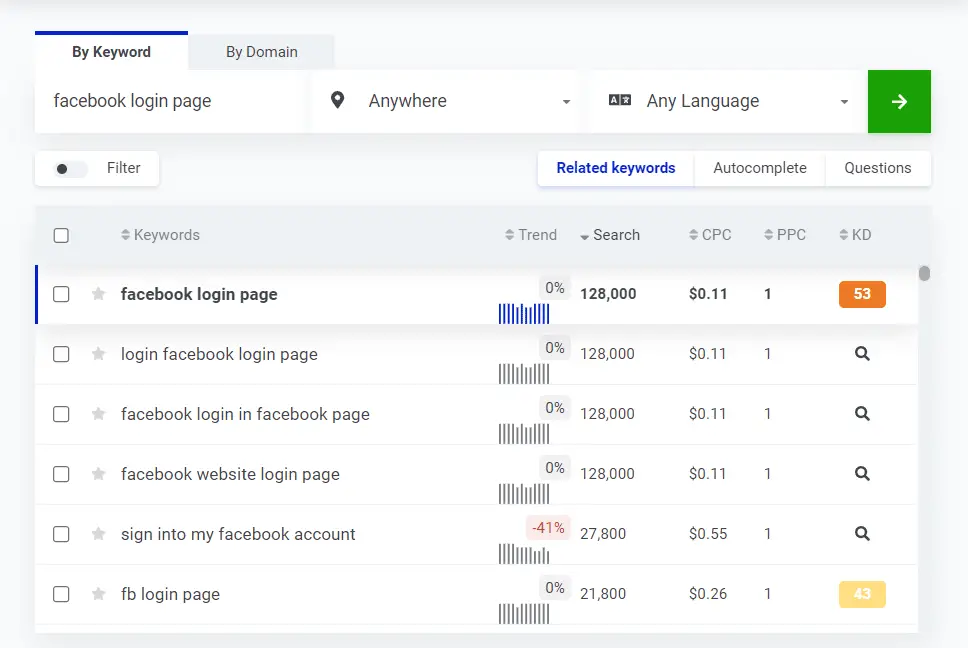
Examples of navigational keywords:
- Google Workspace
- SEO Chatter website
- Facebook login page
- Costco pricing
- Petco grooming center
7. Geo-Targeted Keywords
Geo-targeted keywords are a type of SEO keyword that focuses on a specific location. These keywords are used for localized search results to attract visitors to a local business or storefront.
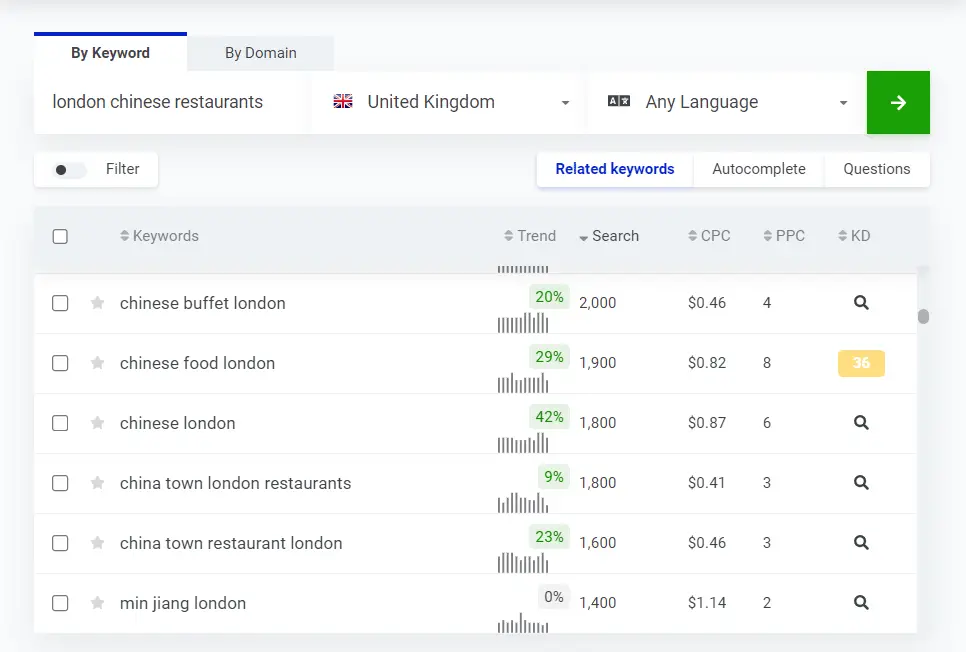
Examples of geo-targeted keywords:
- Las Vegas hotels
- Pools in Waynesville
- Driving lessons France
- London Chinese restaurants
- Tesla service center Dayton
8. Focus Keywords
Focus keywords are the keywords you want a web page to rank the highest for in search engines using SEO. Many website keyword optimization plugins, such as Yoast, RankMath, and AIOSEO, allow you to add a focus keyword (or keyphrase) for the content so you can make sure you’re optimizing for it correctly in the HTML elements that are important for on-page SEO. These optimization plugins report an optimization score from 1 to 100 and give a list of recommendations for improving the score.
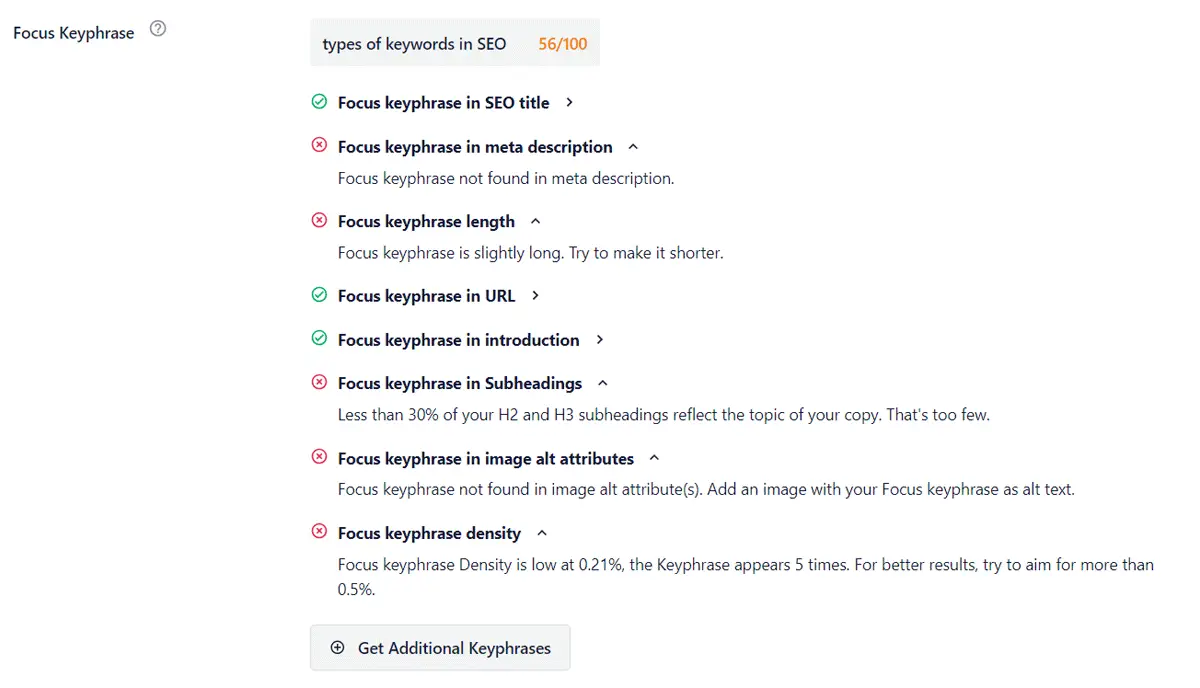
9. Organic Keywords
Organic keywords are a type of keyword in SEO used to attract free website traffic from search engines through the organic listings. This category of keywords is different from pay-per-click (PPC) keywords (explained in the next section), which require advertisers to pay for placement in the search engine results pages (SERPs). See our guide on what are organic keywords for more details.
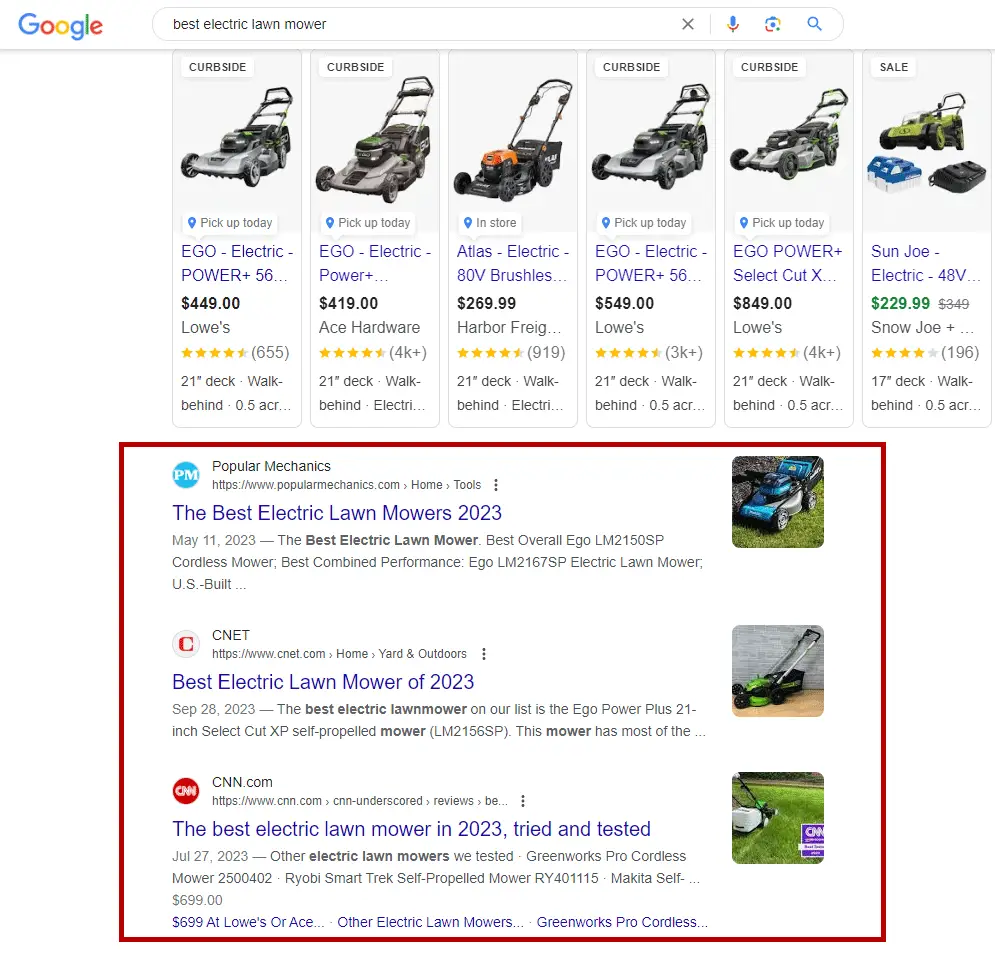
10. Semantic Keywords
Semantic keywords are words and phrases that are conceptually related to a particular keyword or topic. Semantically related keywords include entities that help search engines better understand the content outside of just crawling the exact match keywords on the page.
A well-optimized piece of content needs to include semantic keywords to demonstrate expertise on the topic. Otherwise, the content will lack the second E (for expertise) in the E-E-A-T signals Google’s algorithm uses in its ranking algorithm systems. E-E-A-T stands for Experience, Expertise, Authoritativeness, and Trustworthiness.
Making this keyword type a priority in your SEO campaigns can often help a web page rank higher in Google’s search engine for its main target keyword. Wikipedia is a great example of a website that uses semantic keywords correctly on every web page. Each hyperlink in the content is a semantically related keyword to the primary topic, which is one of the many reasons why Wikipedia ranks at the top of the search results for millions of search queries.
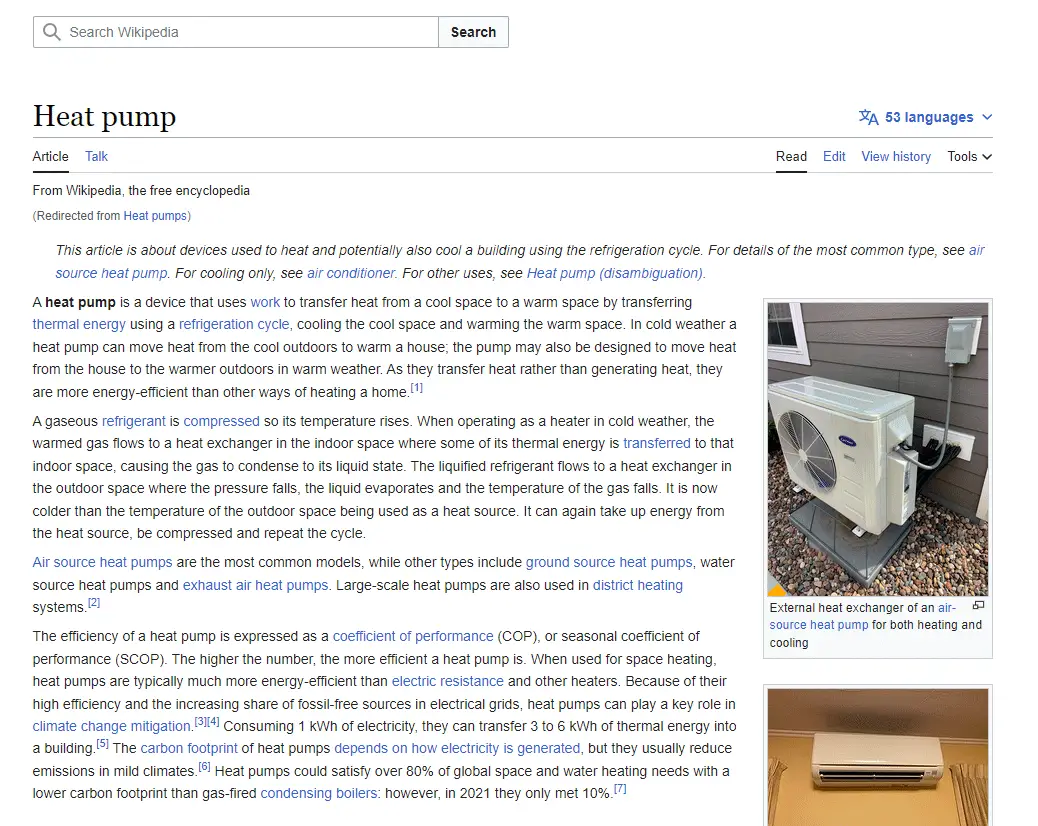
Examples of semantic keywords for the term “heat pump” would be:
- thermal energy
- refrigeration cycle
- refrigerant
- compression
- air source
- ground source
- exhaust air
- coefficient of performance (COP)
- electric resistance
See this related guide on how to find semantic keywords to take advantage of this strategy for your search engine marketing campaigns.
More Keyword Categories You Should Know
A comprehensive search engine marketing strategy will consist of more than just the basic SEO keyword types mentioned above. To get the most value out of digital marketing efforts, you should also consider the following keyword categories that apply to both SEO and paid search campaigns.
Trending Keywords
Trending keywords are terms that have a sudden increase in user interest. This can happen based on a topic being picked up by the news or occur for a particular keyword type during certain times of the year when it’s most popular. Jumping on trending keywords with SEO content and paid ads is an easy way to capture a huge surge of traffic for a website.
Examples of trending keywords:
- National Park Day
- Google antitrust case
- Summer heatwave
- Chiefs vs Eagles
- Black Friday deals
See this related guide on how to find trending SEO keywords to get tips on working this strategy into your search engine marketing campaigns.
Evergreen Keywords
Evergreen keywords are keywords you can use in SEO campaigns and paid ads that continue to stay relevant and fresh in the search engines. Unlike content that’s focused on the trending keyword category that has sudden spikes and drop-offs in search volume, content that’s optimized for evergreen keywords is beneficial over the long term because user interest remains high and continually attracts organic search traffic.
Examples of evergreen keywords:
- how to monetize a website
- what are keyword phrases
- marketing strategies for beginners
- how to choose a fish tank
- best twin size mattresses
Generic Keywords
Generic keywords are a category of keywords that have a wide range of meanings. A generic keyword is often referred to as a short-tail keyword because they are 1-2 words in length and are not specifically defined for the user. See this related page on what are generic keywords for more details.
Examples of generic keywords:
- Desks
- Bar stools
- Dog trimmer
- Apartment sizes
- Mexico
Pay-Per-Click Keywords
Pay-Per-Click (PPC) keywords are a form of online advertising where an advertiser pays money to have their ad appear in the SERPs for particular words or phrases. Bidding on a PPC keyword allows you to rank your website above the organic search results to gain attention from a target audience without having to use organic SEO strategies to acquire top-ranking positions in search engines like Google, Yahoo, or Bing. Learn more about keywords for advertising.
Exact Match Keywords
An exact match keyword is a term or phrase used in SEO and PPC campaigns that match the exact search query for a user. For example, an exact match keyword for the phrase, “men’s running shoes”, would be men’s running shoes.
In SEO, exact match keywords are used by placing the exact word or phrase in the content so it perfectly matches the target search term. In PPC, exact match keywords are the most targeted type of keywords for ad campaigns because they restrict which queries the ad appears for in the search engine so it doesn’t show up for any other types of search, such as a partial or phrase match (explained next).
Phrase Match Keywords
A phrase match keyword is a term or phrase used in PPC ads that is less strict than an exact match keyword. Classifying a term as a phrase match keyword in Google Ads, for example, allows the ad to appear for queries that include the exact match keyword along with other words before or after it in the search query.
For example, a PPC ad that’s targeting the phrase match keyword “best SEO company” may also appear for search queries like:
- best SEO company for small business
- what are the best SEO company providers
- best SEO company reviews
Partial Match Keywords
A partial match keyword is a word or phrase that matches some (or part) of the keyword you’re optimizing a PPC ad for but not all of it. This allows the ad to appear for all queries that have the same user search intent regardless of the exact wording of the query. As a result, partial match keyword types are less strict than phrase match keywords.
For example, an ad that’s targeting the phrase “SEO link building software” and is tagged with the partial match keyword category in Google Ads will appear for queries like:
- link building
- link building software
- SEO tool for link building
- backlink building tools
- software for SEO link building
Broad Match Keywords
A broad match keyword is a keyword match type that allows your PPC ad to show in search results for queries related to the meaning and search intent of the keyword but doesn’t necessarily contain the exact terms. Broad match keywords are the least restrictive category for ad campaigns.
For example, an ad that’s targeting the phrase “low-carb diet” and is tagged with the partial match keyword category in Google Ads will appear for queries like:
- carb-free foods
- low-calorie recipes
- low-carb diet for weightloss
- low-carbohydrate nutrition plan
- carbless meals
Negative Keywords
Negative keywords are words and phrases used in paid search campaigns that allow you to exclude specific search terms from your ads to help your messages only appear for search queries that attract the right type of customers.
Negative keywords are a special category of keywords that work to filter out unrelated searches (on Google Search) and websites and videos (on the Google Display Network) that may artificially inflate the number of ad impressions and clicks from the wrong types of customers.
Negative keywords can also be combined with other keyword match types to specify the level of restriction the negative word or phrase should have on the search query.
For example, if you were creating an ad for an optician that targets the keyword, “eyeglasses”, then you wouldn’t want the ad to appear for searches related to “wine glasses” or “drinking glasses”. Therefore, you would list those types of keyword phrases as negative keywords in the ad campaign to prevent the ad from appearing for unrelated searches.
Branded Keywords
Branded keywords are keywords associated with the company name, its products, or services. A good SEO strategy is to create and optimize website content for all of the relevant branded keywords so your company, products, and services rank highest in the search results for those terms. Otherwise, a competitor may target those branded keywords in their own content to steal traffic from your website.
Optimizing for branded keywords in paid search campaigns is another good strategy in search engine marketing because you can pay to capture the top-ranking spots above the organic search results for your company name, its products, and services. This is an important category of keywords to consider in PPC campaigns because some competitors will purchase branded keywords of other companies for their ad groups to promote themselves as a better alternative for users who are searching for that brand online.
Examples of branded keywords:
- SEO Chatter
- Coach Outlet
- Google Pixel
- Hellofresh registration
- New York Times
See this related article on what are branded keywords for more details about these types of keywords in SEO and PPC.
Naked URL Keywords
Naked URL keywords are an SEO keyword type referred to in link building where the anchor text for the hyperlink uses the URL address for the target web page. A common anchor text ratio optimization practice for link building is to include a percentage of naked URLs in a website’s backlink profile because it looks more natural to the ranking algorithm systems.
Examples of naked URL keywords:
- https://domain.com/page-title/
- https://domain.com/example-folder/page-title.html
- domain.com/page-title/
Page Title Keywords
Page title keywords are keywords that use the target web page’s title in the anchor text of the hyperlink. The link includes the exact title of the target page; nothing more and nothing less.
Examples of page title keywords:
- How To Put Keywords In An Article To Use For SEO
- How to Find the Most Searched Keywords On Google
- How to Find Low Competition Keywords for SEO
- Long Tail vs Short Tail Keywords: What’s the Difference?
Summary for the Different Types of Keywords In SEO
I hope you enjoyed this guide about the different keyword categories in search engine marketing.
As you discovered, there are many types of keywords in SEO and paid search campaigns you can focus on to better optimize your content for Google, Yahoo, and Bing. Hopefully, the explanations and examples of keyword types have helped you determine which variations to use for your search engine marketing strategy.

SEO Chatter is dedicated to teaching the fundamentals of search engine marketing to help marketers understand how to increase organic website traffic and improve search engine rankings.

